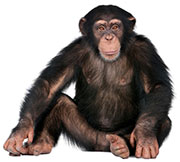- Could Your Grocery Store Meat Be Causing Recurring UTIs?
- Are You Making This Expensive Thermostat Error This Winter?
- Recognizing the Signs of Hypothyroidism
- 10 Strategies to Overcome Insomnia
- Could Artificial Sweeteners Be Aging the Brain Faster?
- Techniques for Soothing Your Nervous System
- Does the Water in Your House Smell Funny? Here’s Why
- Can a Daily Dose of Apple Cider Vinegar Actually Aid Weight Loss?
- 6 Health Beverages That Can Actually Spike Your Blood Sugar
- Treatment Options for Social Anxiety Disorder
Like Humans, Chimps’ Smarts May Rely on Genes


Nature, not nurture, may play the bigger role in the innate intelligence of individual chimpanzees, a new study finds.
“As is the case in humans, genes matter when it comes to cognitive [thinking] abilities in chimpanzees,” William Hopkins of the Yerkes National Primate Research Center in Atlanta, said in a news release from the journal Current Biology.
The findings might also give insight into the evolution of intelligence in humans, Hopkins’ team said.
According to the researchers, experts have long observed that some chimps seem brainier than others. In the new study, the investigators studied 99 chimps, ages 9 to 54. The study found that about half of the variation in intelligence between the individual chimps was due to their genes.
Gender was not factor, and chimps raised by human caretakers did no better on tests of intelligence than those raised by their chimpanzee mothers, according to the study authors.
“It doesn’t mean that [genes] are the only factor determining cognitive abilities, but they cannot be ignored,” Hopkins said in the news release.
The findings suggest that differences in intelligence may have first appeared in the common ancestor of people and chimps about 5 million years ago. The study gives some insight into efforts to pinpoint specific intelligence-related genes, the researchers noted.
“What specific genes underlie the observed individual differences in cognition is not clear,” Hopkins said. However, “pursuing this question may lead to candidate genes that changed in human evolution and allowed for the emergence of some human-specific specializations in cognition,” he added.
The study was published in the journal on July 10.
More information
The Jane Goodall Institute has more about chimpanzees.
Source: HealthDay
Copyright © 2026 HealthDay. All rights reserved.










